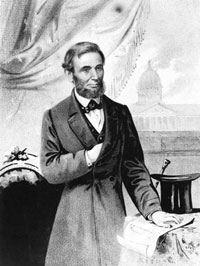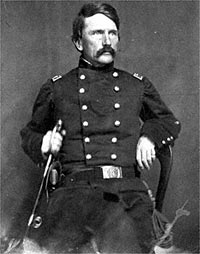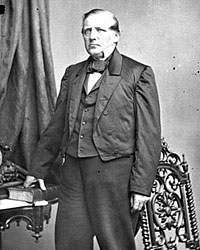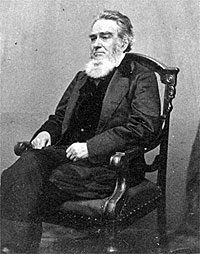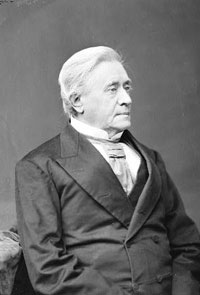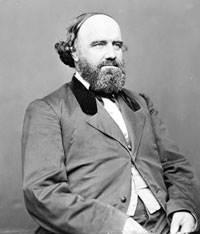The Civil War was a war of contradictions. The South seceded to perpetuate slavery and instead ended up destroying it. North vowed not to interfere with slavery and won sufficient support to kill it. Unlike many abolitionists, President Lincoln understood he couldn’t eliminate slavery without first saving the union. And unlike many conservative Republicans and Democrats, he realized he couldn’t save the union without eliminating slavery. The Emancipation Proclamation was designed to help the Union win the Civil War and thus preserve the Union. “To fight against slaveholders, without fighting against slavery, is but a half-hearted business,” wrote black abolitionist Frederick Douglass. “War for the destruction of liberty must be met with war for the destruction of slavery.”1
Emancipation was justified by a military necessity to preserve the Union. “If the Proclamation of Emancipation was essentially a war measure, it had the desired effect of creating confusion in the South and depriving the Confederacy of much of its valuable laboring force. If it was a diplomatic document, it succeeded in rallying to the Northern cause thousands of English and European laborers who were anxious to see workers gain their freedom throughout the world. If it was a humanitarian document, it gave hope to millions of Negroes that a better day lay ahead, and it renewed the faith of thousands of crusaders who had fought long to win freedom in America,” wrote historian John Hope Franklin.2
The effect and interpretation of the Emancipation Proclamation varied by audience. “The meaning of emancipation has been profoundly shaped by Judeo-Christian concepts of deliverance and redemption,” wrote David Brion Davis. “One thinks immediately of the rich symbolism associated with the Hebrews’ deliverance from bondage in Egypt. The promise of God revealing himself to humanity through a chosen people was signified by an emancipation from physical slavery and a grateful acceptance of a higher form of service. Christian commentators frequently elaborated on the significance of the ancient Hebrew Jubilee, the day of atonement and of liberating slaves in the seventh month following seven sabbatical years.”3 According to William Wolf, President Lincoln “told his callers many times that his concern was not to get God on his side, but to be quite sure that he and the nation were on God’s side. An interview in June 1862 with a delegation from Iowa led by Congressman James Wilson threw more light on this point. It revealed again Lincoln’s strong predestinarian conviction about God’s will. A member was pressing Lincoln for more resolute action on emancipation, saying, ‘Slavery must be stricken down wherever it exists. If we do not do right I believe God will let us go our own way to our ruin. But if we do right, I believe He will lead us safely out of this wilderness, crown our arms with victory, and restore our now dissevered union.”4
President Lincoln did not believe he had the power to end slavery because it was evil, but he believed he could end it to preserve the Union. Historian T. Harry Williams wrote: “Lincoln was on the slavery question, as he was on most matters, a conservative. Unlike the ultra Radicals, he could tolerate evil, especially when he feared that to uproot it would produce greater evils. But he was not the kind of conservative who refused to move at all against evil, who let his pragmatism fade into expediency, who blindly rejected change when it could not be denied. Yet there were just such men among the ultra Conservatives of his party, and Lincoln opposed them as he did the ultra Radicals. He knew that he was not completely with them, and…he would not let the Conservatives control the slavery issue. He knew too that he was against the Radicals and also with them. Speaking of the Missouri Radicals but doubtless having the whole genre in mind, he said: ‘They are utterly lawless – the unhandiest devils in the world to deal with – but after all their faces are set Zionwards.’ He did work with the Radicals but he also resisted them. He used them – as he did the Conservatives – to effect a great social change with the smallest possible social dislocation. It would indeed be an error…to make too much out of the conflict in the Republican party over slavery. It would be a greater error to dismiss this unique episode and its unique issue as something normal or average and to treat it on the level of ordinary politics. There is little about the Civil War that is ordinary.”5 Historian Harry Jaffa wrote:
Both in the pre-inaugural period, and in the opening stages of the conflict, the danger of disunion, now the paramount danger, did not come from the forces of slavery alone. It came as well from the abolitionists. Now the name ‘abolitionist’ was applied to a number of shades of opinion, although it is usually identified with the most extreme among them. However, there was a spectrum of opinions, beginning with those who insisted upon instant emancipation of all slaves, by any means, without regard to existing legality, without regard to the disruption and injury it would cause among both whites and blacks, and without regard to existing legality, without regard to the disruption and injury it would cause among both whites and blacks, and without indemnity or compensation of any kind….As the spectrum proceeded from left to right, at some point the name ‘abolitionist’ ceased to apply, and that of free-soiler replaced it. Lincoln was always a free-soiler, never an abolitionist, and in some respects Lincoln agreed with his Southern brethern that the abolitionists were a curse and an affliction….
In the spectrum of antislavery opinions…Lincoln himself would have to be placed at the farthest limit of the extreme right. He was the most conservative of antislavery men. He did not, in any campaign, urge any form of emancipation other than that implied in the exclusion of slavery from the territories. First privately, later publicly, he favored gradual emancipation, and in the plan he recommended to Congress in December, 1862, the state action which he envisaged might have been extended over thirty-five years, until 1900. In the plan he put forward while a Congressman, in 1848, for emancipation in the District of Columbia, three factors were crucial: it had to be gradual, voluntary (it had to be approved by a referendum in the District), and compensated. But Lincoln’s task, as war came, was to preserve the Union. All the emancipation Lincoln desired, and probably a good deal more, was assured if the Union endured. If it did not endure, all the lets and hindrances exerted upon slavery by the free states in the Union would be removed. The extreme abolitionists, in the supposed purity of their principles, would have abandoned the four million slaves to their fate.6
The President followed a moderate policy between Republican Radicals and Conservatives. “In the President of the United States Providence has vouchsafed a leader whose moral perceptions are blinded neither by sophistry nor enthusiasm – who knows that permanent results must grow, and can not be prematurely seized,” editorialized Harper’s Weekly in June 1862.7 Historian LaWanda Cox wrote: “For Lincoln, limited policy and sweeping principle were morally compatible. During one of the debates with [Stephen] Douglas in 1858, he advanced the explanation. In defense of the men who had fought for the revolutionary principles of equality and freedom, and then established a government that recognized slavery, he argued that to the extent ‘a necessity is imposed upon a man, he must submit to it.’ Slavery existed, and agreement on the Constitution could not have been had without permitting slavery to remain. But the necessity did not invalidate the standard raised in the Declaration of Independence: ‘So I say in relation to the principle that all men are created equal, let it be as nearly reached as we can.'”8 Historian Benjamin Quarles wrote:
The Lincoln of the White House years had deep convictions about the wrongness of slavery. But as Chief Magistrate he made a sharp distinction between his personal beliefs and his official actions. Whatever was constitutional he must support regardless of his private feelings. If the states, under the rights reserved to them, persisted in clinging to practices that he regarded as outmoded, he had no right to interfere. His job was to uphold the Constitution, not to impose his own standards of public morality.
As a constitutionalist Lincoln was dedicated to the preservation of the Union. If Lincoln had a ruling passion, it was to show the world that a government based on the principles of liberty and equality was not a passing, short-lived experiment. Up to the time of the Civil War many people, particularly in the Old World, were skeptical about the staying power of America. These doubters believed that a kingless government carried the seeds of its own destruction. Lincoln believed otherwise. He was determined that the American experiment in democracy must not fail, and that such a government by the people ‘can long endure.'”
Lincoln’s behavior on Negro questions not only was a product of his temperament but also reflected his sensitivity to public opinion. Lincoln always had his ear to the ground, trying to sense the mood of America, the things for which men would fight and die. He was a practical politician with a coldly logical mind which impelled him to accommodate himself to the prevailing currents.”9
A cancer metaphor was a favorite of the President that summer. When a Presbyterian delegation visited him on July 17, he told them: “Had Slavery no existence among us, and were the question asked shall we adopt such an institution? We should agree as to the reply which should be made. If there be any diversity in our views it is not as to whether we should receive Slavery when free from it, but as to how we may best get rid of it already amongst us. Were an individual asked whether he would wish to have a wen on his neck, he could not hesitate as to the reply; but were it asked whether a man who has such a wen should at once be relieved of it by the application of the surgeon’s knife, there might be diversity of opinion, perhaps the man might bleed to death, as the result of such an operation.” He added: “Feeling deeply my responsibility, to my country and to that God to whom we all owe allegiance, I assure you I will try to do my best, and so may God help me.”10
When Reverend Elbert. Porter visited President Lincoln in at the Soldiers’ Home in July, Lincoln told him that “American slavery is no small affair, and it cannot be done away with at once. It is part of our national life. It is not of yesterday. It began in colonial times. In one way or another it has shaped nearly everything that enters into what we call government. It is as much northern as it is southern. It is not merely a local or geographical institution. It belongs to our politics, to our industries, to our commerce, and to our religion. Every portion of our territory in some form or another has contributed to the growth and the increase of slavery. It has been nearly two hundred years coming up to its present proportions. It is wrong, a great evil indeed, but the South is nor more responsible for the wrong done to the African race than is the North.”11
President Lincoln the put his hand on the back of the Reverend Porters head and said: “Here is a tumor, ‘drawing upon the vitality of your body. You must be rid of it or it will destroy your life. Now we bring in three physicians to have a consultation over this tumor. All agree at once that it must be removed, but each one has his own opinion of the proper course to be pursued. One wants to poultice it and sweat it and so evaporate it. Another is positive that it should be taken out at once, that it should be cut and pulled out, even at the risk of the patient’s life. But the third doctor says, ‘Gentlemen, I differ from you both as to the treatment proposed. My advice is to prepare the patient for the operation before venturing on it. He must be depleted and amount of his blood diminished.’ Now, my opinion is that the third doctor is about right.”12
Historian David Brion Davis wrote of the impact of the Second Confiscation Act: “In 1862, when Lincoln was considering abstract plans for gradual emancipation and colonization, he also knew that the institution of slavery was rapidly disintegrating in the counties along the Potomac. Blacks from Virginia and Maryland were seeking refuge in the District of Columbia and within Union lines, where they brought invaluable intelligence regarding enemy troops, spies, roads, and terrain. Military reverses strengthen the pressure to enlist black troops and to invoke the ultimate weapon of slave emancipation. In the confiscation act of July 17, Congress ruled that the slaves of rebel owners would be ‘forever free of their servitude’ the moment they cross Union lines. Although Lincoln showed little interest in enforcing this measure, at least until September 22, Congress in effect defined the Union army as an army of liberation. Yet the act applied only to individual fugitives whose owners had engaged in or actively supported the rebellion.”13
Despite criticism that the Emancipation Proclamation did not free slaves in areas controlled by the Union, President Lincoln understood the impact his act would have. He later discussed the proclamation with artist Francis Carpenter: “…it is the central act of my administration and the great event of the nineteenth century.”14 Two years later, Mr. Lincoln extended emancipation’s impact by pushing passage of the Thirteenth Amendment abolishing slavery through the House of Representatives. His actions led black writer and activist W.E.B. DuBois to call President Lincoln “the noblest friend of the slave” and “perhaps the greatest figure of the nineteenth century.” Writing sixty years after the Emancipation Proclamation, DuBois said of the Great Emancipator: “I love him not because he was perfect but because he was not and yet triumphed.”15
In December 1865, eight months after Mr. Lincoln was assassinated, Frederick Douglass gave a speech in which he reviewed the President’s efforts to end slavery. Douglass said of President Lincoln: “He saw the absurdity of asking men to fight for a government which should degrade them and the meanness of enfranchising enemies and dis[en]franchising friends. He was a progressive man, a humane man, an unhonorable man, and at heart an antislavery man.”16
Historian Edna Greene Medford wrote: “The more one recognizes the centrality of enslaved and free people of color in the process of emancipation, however, the more one becomes aware of the significance of Lincoln and his historic document to the people who were most directly affected by its provisions. Despite its shortcomings (and there were many), contemporary African-Americans saw in the Emancipation Proclamation a document with limitless possibilities. To them, it represented the promise not only of freedom and an end to their degradation, but it encouraged the hope for full citizenship and inclusion in the country of their birth as well. Although liberating in theory rather than in reality, people of color saw the proclamation as a watershed in their quest for human dignity and recognition as Americans.”17
President Lincoln’s friend and political ally, Pennsylvanian Alexander K. McClure, remembered: “The most earnest discussions I ever had with Lincoln were on the subject of his Emancipation Proclamation.”18 McClure wrote: “Lincoln issued the Emancipation Proclamation because it was an imperious duty, and because the time had come when any temporizing with the question would have been more fatal than could possibly be any temporary revolt against the manly declaration of right. He felt strong enough to maintain the freedom he proclaimed by the military and naval power of the government. He believed it to be the most mortal wound that could be inflicted upon the Confederacy. He believed that it would disarm the strong anti-Union sentiment that seemed to be fast pressing the English government to the recognition of the South, and he believed that, however public sentiment might falter for a time, like the disturbed and quivering needle it would surely settle to the pole. He did not issue it for the mere sentiment of unshackling four millions of slaves, nor did he then dream of universal citizenship and suffrage to freedmen. In the last public address that he ever delivered, on the 11th of April, 1865, speaking of negro suffrage, he said: ‘I would myself prefer that suffrage were now conferred upon the very intelligent and on those who served our cause as soldiers.’ He believed it to be simply an act of justice that every colored man who had fought for his freedom and for the maintenance of the Union, and was honorably discharged from the military service, should be clothed with the right of franchise; and he believed that ‘the very intelligent’ should also be enfranchised as exemplars of their race and an inspiration to them for advancement. He was always stubbornly for justice, stubbornly for the right, and it was his sublime devotion to the right in the face of the most appalling opposition that made the name of Abraham Lincoln immortal as the author of the Emancipation Proclamation, on which he justly invoked ‘the considerate judgment of mankind and the gracious favor of Almighty God.”19
Historian Hans L. Trefousse wrote: “The final proclamation followed on 1 January 1863, and having already told a delegation of Kentuckians that he would rather die than take back a word of it, he made it known that he would never repeal it. He affirmed its validity to James C. Conkling in August 1863, and in April of the next year wrote to A.G. Hodges, ‘If slavery is not wrong, nothing is wrong.'”20 The Emancipation Proclamation ratified that belief.
Footnotes
- James M. McPherson, Crossroads of Freedom: Antietam, p. 61.
- John Hope Franklin, From Slavery to Freedom: A History of Negro Americans, p. 283-284.
- Gabor S. Boritt, editor, Lincoln the War President, p. 67 (David Brion Davis, “The Emancipation Moment”).
- William Wolf, The Almost Chosen People, p. 146.
- Don E. Fehrenbacher, editor, Dwight Lowell Dumond, The Leadership of Abraham Lincoln, p. 109-110 (T. Harry Williams).
- Don E. Fehrenbacher, editor, Dwight Lowell Dumond, The Leadership of Abraham Lincoln, p. 142-143 (From Harry V. Jaffa, “The Emancipation Proclamation” in Robert A. Godwin editor, 100 Years of Emancipation, Kenyon College, 1963, p. 1-23.).
- Carl Sandburg, Abraham Lincoln: The Prairie Years and the War Years, p. 318.
- LaWanda Cox, Lincoln and Black Freedom, p. 5.
- Benjamin Quarles, Lincoln and the Negro, p. 82-83.
- Roy P. Basler, editor, The Collected Works of Abraham Lincoln, Volume V, p. 327 (July 17, 1862).
- Don E. and Virginia E. Fehrenbacher, editor, Recollected Words of Abraham Lincoln, p. 368.
- Don E. and Virginia E. Fehrenbacher, editor, Recollected Words of Abraham Lincoln, p. 368.
- Gabor S. Boritt, editor, Lincoln the War President, p. 85 (David Brion Davis, “The Emancipation Moment”).
- Burlingame, .
- Burlingame, .
- Burlingame, .
- John Y. Simon Harold Holzer and William D. Pederson, Lincoln, Gettysburg and the Civil War, p. 48 (Edna Greene Medford).
- Alexander K. McCLure, Abraham Lincoln and Men of War-Times, p. 111.
- Alexander K. McCLure, Abraham Lincoln and Men of War-Times, p. 113-114.
- Martin H. Greenberg and Charles G. Waugh, editor, The Price of Freedom: Slavery and the Civil War, Volume I, p. 320-321 (Hans L. Trefousse, “Lincoln and Race Relations”).




